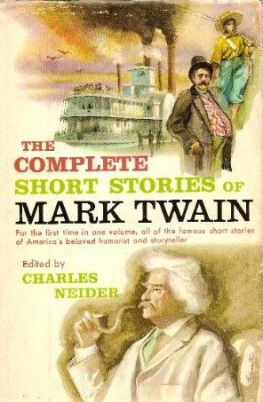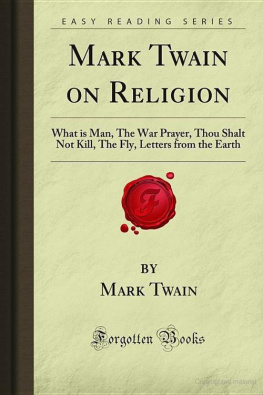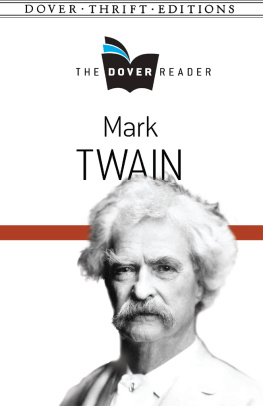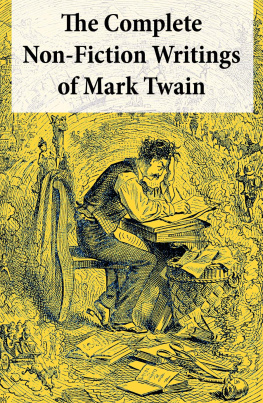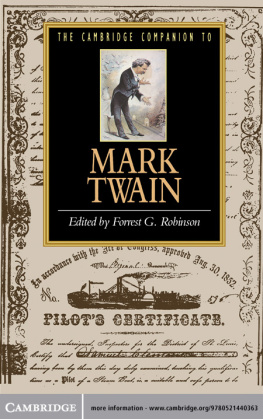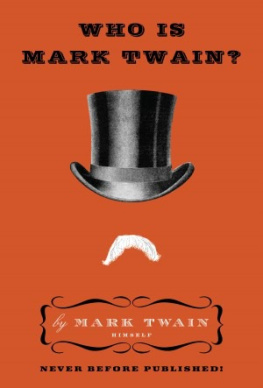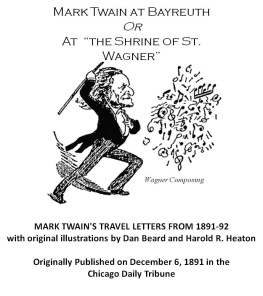Table of Contents
For a long time the DeVoto Portable was the handiest single-volume collection for the general reader. This one is even better. Its an indispensable anthology of Americas indispensable author.
Justin Kaplan
If this isnt the thoughtfulest and usefulest hand-tooled gilt-edged one-volume Twain, I am a horned toad.
Frederick Crews
Bernard DeVoto would have agreed loudest of all that its time to redo The Portable Mark Twain, time for a fresh look at basic materials and for building in new materials that have turned up since 1946. Though a tough judge of literary critics, he would also have agreed, I feel, that Tom Quirk was the best choice to put state-of-the art wheels, styling, and accessories on this pacesetter for Mark Twain anthologies.
Louis J. Budd, James B. Duke Professor of English (Emeritus), Duke University, author of Our Mark Twain
Mark Twain is back amongst us (and not a moment too soon), trailing rainbows and thunderbolts of the American language that he invented, mostly. His escort and great good friend on this visit, Tom Quirk, offers an introduction that reminds us why Twain will never not be necessary to a true understanding of our country. And Mark takes itand usfrom there.
Ron Powers, author of Dangerous Water: A Biography of the Boy Who Became Mark Twain
Trying to put your arms around Mark Twain is like trying to embrace the Mississippi. He is endless. This Portable, however, should open his richness to the new reader and remind the older ones of the wealth they may have forgotten. Reading him again is like biting into fresh bread.
Arthur Miller
THE PORTABLE MARK TWAIN
SAMUEL LANGHORNE CLEMENS was born on November 30, 1835, in Florida, Missouri, about forty miles southwest of Hannibal, the Mississippi River town Clemens was to celebrate as Mark Twain. He left home in 1853, earning a living as an itinerant typesetter, and four years later became an apprentice pilot on the Mississippi, a career cut short by the outbreak of the Civil War. For five years, as a prospector and a journalist, Clemens lived in Nevada and California. In February, 1863, he first used the pseudonym Mark Twain as the signature to a humorous travel letter; and a trip to Europe and the Holy Land in 1867 became the basis of his first major book, The Innocents Abroad (1869). Roughing It (1872), his account of experiences in the West, was followed by a satirical novel, The Gilded Age (1873), Tom Sawyer (1876), A Tramp Abroad (1880), Life on the Mississippi (1883), and his masterpiece, Adventures of Huckleberry Finn (1885). Following the publication of A Connecticut Yankee in King Arthurs Court (1889) and Puddnhead Wilson (1894), Twain was compelled by debts to move his family abroad. By 1900 he had completed a round-the-world lecture tour, and, his fortunes mended, he returned to America. He was as celebrated for his white suit and his mane of white hair as he was for his uncompromising stands against injustice and imperialism and for his invariably quoted comments on any subject under the sun. Samuel Clemens died on April 21, 1910.
TOM QUIRK is professor of English at the University of Missouri- Columbia. He is the editor of the Penguin Classics editions of Mark Twains Tales, Speeches, Essays, and Sketches (1994) and The Innocents Abroad (2002), and Ambrose Bierces Tales of Soldiers and Civilians and Other Stories (2000), and coeditor of The Portable American Realism Reader (1997). His books include Coming to Grips with Huckleberry Finn (1993), Mark Twain: A Study of the Short Fiction (1997), and Nothing Abstract: Investigations in the American Literary Imagination (2001).
Introduction
I
During his last decade, Samuel Clemens was writing, or rather dictating, his Autobiography. It was a work that only death could complete and would be published, if at all, long after he was gone. Clemens embraced the premise, for it meant that he might speak, so he liked to believe, without reserve or constraint; speak with the bluntness only a dead man might enjoy. In casual yet systematic fashion, he committed himself to narrating his life according to whim and random recollection. The publication in 1906 of a bastardized version of his earlier anthology, Mark Twains Library of Humor (1888), at once incited his fury and provoked a certain introspection and became a subject for one mornings dictation. Perusing the contents, Mark Twain reflected in his Autobiography on the fate of nineteenth-century humorists. For the forty years wherein I have been playing professional humorist before the public, he observed, a host of literary comedians have come and gone. Why have they perished? Because they were merely humorists. Humorists of the mere sort cannot survive. Humor is only a fragrance, a decoration. And Why (he implicitly asks) have I lasted? Because (he implicitly answers) I am a moralist, and they were not. Humor must not professedly teach and it must not professedly preach, he continued, but it must do both if it would last forever. By forever, I mean thirty years. With all its preaching it is not likely to outlive so long a term as that.
Already, Twain is indulging in fuzzy math. The fame of the mere humorist is extinguished in a few years, but even the humorous moralist cannot expect more than thirty years. However, Twain himself has just observed that he has been a professional humorist for forty years, a full decade beyond forever. But he is not through with his calculations:
I have always preached. That is the reason that I have lasted thirty years. If the humor came of its own accord and uninvited I have allowed it a place in my sermon, but I was not writing the sermon for the sake of the humor. I should have written the sermon just the same, whether any humor applied for admission or not. I am saying these vain things in this frank way because I am a dead person speaking from the grave. Even I would be too modest to say them in life. I think we never become really and genuinely our entire and honest selves until we are deadand not then until we have been dead years and years. People ought to start dead and then they would be honest so much earlier.
In order to be absolutely honest with his readers, Clemens imagines speaking from beyond the grave, bound by neither time nor occasion. The presupposition, of course, is that he is being beforehand with a world not yet born, and he adopts the position of a ghost in the narrative machine of his own making. But behind the undertaking there is also the presumption that Mark Twain will be of continuing interest for generations to come, far longer than the thirty (or perhaps forty) years allotted to him or any other humorist. And, his protestations notwithstanding, Twain remains a humorist to the last. The mysteriously complicated, even irreconcilable, carbon dating of his lasting fame is finally a sly prologue to the punch linePeople ought to start dead.
The vaunted boast of this self-assessment (at once retrospective and predictive) is in stark contrast to the confession he made to his brother Orion, in an 1865 letter: I have had a call to literature, of a low orderi.e., humorous. It is nothing to be proud of, but it is my strongest suit, & if I were to listen to that maxim of stern duty which says that to do right you must multiply the one or the two or the three talents which the Almighty trusts to our keeping, I would long ago have ceased to meddle with the things for which I was by nature unfitted & turned my attention to seriously scribbling to excite the laughter of Gods creatures. Poor, pitiful business! When he made this declaration, Clemens was thirty years old, high time for a man to have settled into an occupation, however lowly. It is true that he had turned his hand to other work from an early age. It is probably true that he would have been content to have remained a riverboat pilot, had not the Civil War effectively ended that career; at least he made that claim more than once. It is unfortunately true as well that he did not cease to meddle in things beyond his peculiar kenas entrepreneur and businessman, publisher and self-appointed philosopher, inventor and investorand much of this meddling cost him hard coin and caused him grief.





